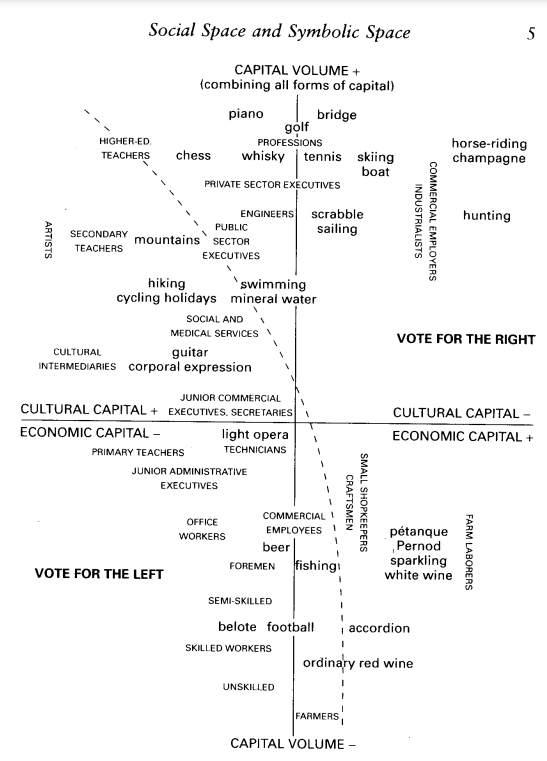seminar 3: Bourdieu
how to do sociology: not grand theory (big ideas, not really get empirical data from the social world) we shouldn’t lose ourselves in special cases, study the normal, the familiar,
deepest logic (the universal truth, what unites all those different phenomena, what is behind what we perceive) of the social world can be grasped only if one plunges into particularity of an empirical reality (not comparing, but going to the deepest essence of something so you can then get to a universal truth to compare to other things), with the objective it as a special case of what is possible (example friends is something possible within social spaces; example Japan vs France: both social spaces, but in different ways, different things give difference in different places, racist logic stays the same for example but different forms in which it manifests)
questions:
1 forget about Bourdieu for a sec: discuss something you like. go to the bottom of why you like it in order to seek out the universal logic behind your preference
our answer: travelling and your phone (exploring), coffee and pink (want to buy), singing and reading (imagination and creativity), crochet and dogs (fluffy)
answer: we like things either because of quality or ourselves = really substantialist, because
2 how do substantialists uncerstand taste? why are they wrong according to Bourdieu? give examples to develop your arguments
our answer: substantialists consider each practice in and of itself, independently of the universe of substitutable positions and tastes or practices as a mechanical and direct relation. stresses the primacy of existence over consciousness and that social life is 'explained' by social conditions of existence. Then taste is determined by social conditions
answer:in and of itself (reading is alone, going to parties is for extraverts), substitutable practices (it’s not about the qualities, but about the relation of it to other practices), you have to look at how things relate to other things (coffee don’t want redbull because different meaning)
3 according to bourdieu, tastes or preferences are relational. that is, a set of practices can be distinguished. Explain with the concepts of symbolic space, homology, distinction and symbolic violence
answer: symbolic violence (hating on the things someone likes), homology (people relate to each other), symbolic space (what you relate to a space)
answer: set of practices can be distinguished (example students, relates to microwave, stress, library, snoozing, backpacking and example mac and cheese, relates to American, lazy, fat, unhealthy and example golf, relates to rich, champagne, bussiness deals)
social space if sifference: far away is not related like golf and mac and cheese, symbolic because has meaning, homology is how things relate, distinction is how things not relate but for Bourdieu it’s more fundamental: distinguishing yourself
like going home with a book, then your parents tell your siblings they should like books
he writes social classes don’t exist: we can group people together based on certain cahracteristics or lifestyles, he means they don’t exist as groups (pol. mobilised and evverything)
social classes theoretical sense:
Bourdieu presentation: relations between classes and presents them in social space (he takes a population like Belgium, then represents classes as in the same space, but there’s different distances which signify how much you have in common with each other) in cultural and economic space
only capital if it is valued by everyone
economic capital: money, properties, investments, goods
cultural capital: education, knowledge, skills
each class of positions corresponds to class of habitus produced by social conditioning associated with corresponding condition and through mediation of habitus and its generative capability, systematic set of goods and properties which are united by an affinity of style (people in upperright corner are the rich bitches, united by luxury, upperleft corner united by liking books, art and knowledge in other words aesthetic lifestyle, working class united by lifestyle of necessity so big portions of fast food because energy, middle class united by lifestyle of austerity)

habitus: not what you do but what you tend to do and how you do them (example: alcohol drinks; upper right corner expensive drinks, upper left special drinks, working class cheap drinks and middle class try to distinguish but not too special or expensive also difference in how everyone drinks)
habitus is generative and unifying principle which retranslates intrinsic and relational characteristics of a position into a unitary set of choices of persons, goods, practices
social space space of individuals and wher you grew up, symbolic space is spacce of rpactices, habitus inbetween: because of your position in social space you like certain things from symbolic spaces